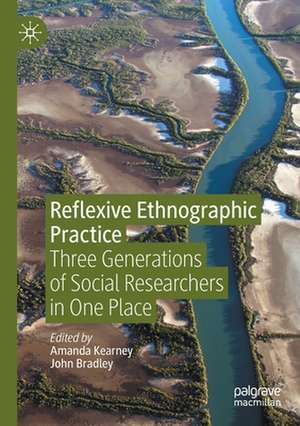Reflexive Ethnographic Practice: Three Generations of Social Researchers in One Place
Editat de Amanda Kearney, John Bradleyen Limba Engleză Paperback – 22 ian 2021
| Toate formatele și edițiile | Preț | Express |
|---|---|---|
| Paperback (1) | 727.97 lei 6-8 săpt. | |
| Springer International Publishing – 22 ian 2021 | 727.97 lei 6-8 săpt. | |
| Hardback (1) | 731.25 lei 6-8 săpt. | |
| Springer International Publishing – 22 ian 2020 | 731.25 lei 6-8 săpt. |
Preț: 727.97 lei
Preț vechi: 887.76 lei
-18% Nou
Puncte Express: 1092
Preț estimativ în valută:
139.30€ • 145.93$ • 115.45£
139.30€ • 145.93$ • 115.45£
Carte tipărită la comandă
Livrare economică 09-23 aprilie
Preluare comenzi: 021 569.72.76
Specificații
ISBN-13: 9783030349004
ISBN-10: 3030349004
Pagini: 219
Ilustrații: XXIV, 219 p. 28 illus., 26 illus. in color.
Dimensiuni: 148 x 210 mm
Greutate: 0.45 kg
Ediția:1st ed. 2020
Editura: Springer International Publishing
Colecția Palgrave Macmillan
Locul publicării:Cham, Switzerland
ISBN-10: 3030349004
Pagini: 219
Ilustrații: XXIV, 219 p. 28 illus., 26 illus. in color.
Dimensiuni: 148 x 210 mm
Greutate: 0.45 kg
Ediția:1st ed. 2020
Editura: Springer International Publishing
Colecția Palgrave Macmillan
Locul publicării:Cham, Switzerland
Cuprins
Foreword.- Chapter 1: Introduction - The Scene for a Reflexive Practice.- Chapter 2: Writing From the Edge: Writing What Was Never Meant to be Written.- Chapter 3: Mobility of Mind: Can We Change our Epistemic Habit Through Sustained Ethnograpic Encounters?.- Chapter 4: Mapping the Route to the Yanyuwa Atlas.- Chapter 5: "Invisible Things in Nature": A Reflexive Reading of Alexis Wright's Carpentaria.- Chapter 6: Encounters with Yanyuwa Rock Art: Reflexivity, Multivocality, and the 'Archaeological Record' in Northern Australia's Southwest Gulf Country.- Chapter 7: So Did You Find Any Culture Up Here Mate?: Young Men, 'Deficit' and Change.
Notă biografică
Amanda Kearney is Matthew Flinders Fellow and Professor of Indigenous and Australian Studies at Flinders University, Australia.
John Bradley is Associate Professor and Deputy Director of the Monash Indigenous Centre at Monash University, Australia.
John Bradley is Associate Professor and Deputy Director of the Monash Indigenous Centre at Monash University, Australia.
Textul de pe ultima copertă
“This moving book offers a profound vision of all that reflexive ethnography can be if carried out with sensitivity, humility, and respect for the multiple layers of history in which our work is always enmeshed.”
—Ruth Behar, Professor at the University of Michigan, USA, and author of Traveling Heavy: A Memoir in Between Journeys
“In essays which span forty years of immersion in Yanyuwa culture and ethnographic fieldwork, the authors reflect on their professional practices through the lens of self-scrutiny, discomfort, uncertainty and awe, exploring the tensions and contradictions between academic rigour and the visceral apprehension of different ways of perceiving the world. This book is a timely and essential contribution to the increasingly complex discourse around how to live with, work with, and write about Indigenous people.”
—Kim Mahood, award-winning Australian author and artist
Putting the anthropological imagination underthe spotlight, this book represents the experience of three generations of researchers, each of whom have long collaborated with the same Indigenous community over the course of their careers. In the context of a remote Indigenous Australian community in northern Australia, these researchers—anthropologists, an archeologist, a literary scholar, and an artist—encounter reflexivity and ethnographic practice through deeply personal and professionally revealing accounts of anthropological consciousness, relational encounters, and knowledge sharing. In six discrete chapters, the authors reveal the complexities that run through these relationships, considering how any one of us builds knowledge, shares knowledge, how we encounter different and new knowledge, and how well we are positioned to understand the lived experiences of others, whilst making ourselves fully available to personal change. At its core, this anthology is a meditation on learning and friendship across cultures.
—Ruth Behar, Professor at the University of Michigan, USA, and author of Traveling Heavy: A Memoir in Between Journeys
“In essays which span forty years of immersion in Yanyuwa culture and ethnographic fieldwork, the authors reflect on their professional practices through the lens of self-scrutiny, discomfort, uncertainty and awe, exploring the tensions and contradictions between academic rigour and the visceral apprehension of different ways of perceiving the world. This book is a timely and essential contribution to the increasingly complex discourse around how to live with, work with, and write about Indigenous people.”
—Kim Mahood, award-winning Australian author and artist
Putting the anthropological imagination underthe spotlight, this book represents the experience of three generations of researchers, each of whom have long collaborated with the same Indigenous community over the course of their careers. In the context of a remote Indigenous Australian community in northern Australia, these researchers—anthropologists, an archeologist, a literary scholar, and an artist—encounter reflexivity and ethnographic practice through deeply personal and professionally revealing accounts of anthropological consciousness, relational encounters, and knowledge sharing. In six discrete chapters, the authors reveal the complexities that run through these relationships, considering how any one of us builds knowledge, shares knowledge, how we encounter different and new knowledge, and how well we are positioned to understand the lived experiences of others, whilst making ourselves fully available to personal change. At its core, this anthology is a meditation on learning and friendship across cultures.
Caracteristici
A revealing account of ethnographic fieldwork in the context of one Indigenous community in northern Australia Combines personal and professional accounts of the challenges and benefits of long-term collaboration and ethnographic encounters with Indigenous peoples Explores critical reflexivity through ethnographic approaches of “responsive reflexivity,” “bracketing,” “introspection,” “inter-subjective reflection,” “mutual collaboration,” and “ironic deconstruction”
